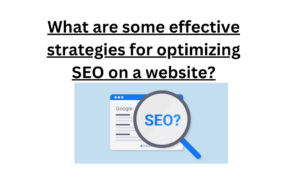What are some effective strategies for optimizing SEO on a website?

Effective Strategies for Optimizing SEO on a Website
Search Engine Optimization (SEO) is crucial for ensuring a website’s visibility and ranking on search engine results pages (SERPs). It involves various strategies to improve organic traffic and enhance the user experience. Let’s delve into some effective techniques for optimizing SEO on a website:
Introduction
In today’s digital landscape, SEO plays a pivotal role in determining the success of a website. SEO encompasses a range of strategies aimed at improving a website’s visibility and ranking on search engine results pages (SERPs). By optimizing SEO, website owners can attract more organic traffic and enhance their online presence.
Keyword Research
One of the foundational elements of SEO is keyword research. This involves identifying relevant keywords that potential visitors might use when searching for content, products, or services related to your website. Conducting comprehensive keyword research allows you to understand the search intent of your target audience and tailor your content accordingly. Utilize tools such as Google Keyword Planner, SEMrush, or Ahrefs to identify high-volume and low-competition keywords relevant to your niche.
On-Page Optimization
On-page optimization refers to the practice of optimizing individual web pages to improve their search engine rankings and attract more relevant traffic. Key aspects of on-page optimization include:
- Title Tags: Incorporate target keywords into title tags while ensuring they remain concise and compelling.
- Meta Descriptions: Write informative meta descriptions that accurately summarize the content of the page and entice users to click through.
- Heading Tags: Use hierarchical heading tags (H1, H2, H3) to structure your content and incorporate keywords naturally.
- URL Structure: Create SEO-friendly URLs that include descriptive keywords and make it easier for search engines to understand the page’s content.
- Content Optimization: Produce high-quality, relevant content that addresses the needs and interests of your target audience. Incorporate keywords naturally throughout the content without resorting to keyword stuffing.
Mobile Optimization
With the increasing prevalence of mobile devices, optimizing your website for mobile users is essential for SEO success. Mobile optimization involves ensuring that your website is responsive and user-friendly across various mobile devices and screen sizes. Google prioritizes mobile-friendly websites in its search rankings, making mobile optimization a critical aspect of SEO strategy.
Page Speed
Page speed significantly impacts user experience and search engine rankings. Websites with slow loading times are more likely to experience higher bounce rates and lower search rankings. To improve page speed, consider:
- Optimizing Images: Compress images and use appropriate file formats to reduce their size without compromising quality.
- Minimizing HTTP Requests: Reduce the number of elements on your webpage that require separate HTTP requests, such as scripts, stylesheets, and images.
- Utilizing Caching: Implement browser caching and server-side caching to store frequently accessed resources and reduce loading times for returning visitors.
Internal Linking
Internal linking involves linking to other pages within your website, thereby establishing a hierarchy and spreading link equity throughout your site. Internal links facilitate navigation for users and help search engines discover and index new pages. When implementing internal linking, focus on relevance and context, and avoid over-optimization or excessive linking.
External Linking
External linking refers to linking your website to external sources or authoritative websites. Including outbound links to reputable sources can enhance the credibility and relevance of your content, improving your website’s authority in the eyes of search engines. However, exercise discretion when linking externally and ensure that the linked content adds value to your own.
Schema Markup
Schema markup is a form of structured data that provides additional context to search engines about the content of your website. By implementing schema markup, you can enhance your search listings with rich snippets, such as star ratings, reviews, and product information. This can improve visibility and click-through rates on SERPs, thereby boosting organic traffic to your website.
Image Optimization
Optimizing images is essential for improving website performance and SEO. Proper image optimization involves:
- Optimizing Alt Text: Include descriptive alt text for images to improve accessibility and provide context to search engines.
- Reducing File Size: Compress images to reduce their file size without compromising quality, thus minimizing page load times.
- Using Descriptive Filenames: Rename image files with relevant keywords to improve their discoverability in image search results.
Regular Content Updates
Keeping your website’s content fresh and up-to-date is crucial for SEO success. Regularly updating your content signals to search engines that your website is active and relevant, which can positively impact your search rankings. Additionally, fresh content provides more opportunities to target new keywords and attract additional organic traffic.
Social Media Integration
Social media plays a significant role in SEO by increasing brand visibility, driving traffic to your website, and enhancing engagement. Integrate social media into your SEO strategy by:
- Sharing Content: Share your website’s content across various social media platforms to reach a broader audience and encourage engagement.
- Building Backlinks: Social media activity can generate backlinks to your website, which can improve your site’s authority and search rankings.
- Engaging with Followers: Interact with your social media followers by responding to comments, addressing inquiries, and fostering relationships, which can lead to increased brand loyalty and positive word-of-mouth.
SSL Certificate
An SSL (Secure Sockets Layer) certificate encrypts data transmitted between a user’s browser and your website, ensuring secure communication. In addition to enhancing security for your visitors, having an SSL certificate is a ranking factor for search engines like Google. Websites with SSL certificates are favored in search rankings, making SSL implementation essential for SEO success.
What is search engine Why do we need them?
Local SEO
Local SEO focuses on optimizing your website for local searches, particularly relevant for businesses with physical locations or those targeting specific geographical areas. Key strategies for local SEO include:
- Optimizing Google My Business: Claim and optimize your Google My Business listing with accurate business information, photos, and reviews.
- Local Keyword Targeting: Incorporate location-based keywords into your content, meta tags, and URL structures to improve visibility in local search results.
- Obtaining Local Citations: Ensure your business is listed accurately in online directories, local business listings, and review sites to improve local SEO rankings.
What are some effective strategies for optimizing SEO on a website
Monitor and Analyze
Monitoring and analyzing your website’s performance is crucial for optimizing your SEO strategy and identifying areas for improvement. Utilize tools such as Google Analytics and Google Search Console to:
- Track Website Traffic: Monitor the volume and sources of traffic to your website to understand user behaviour and identify growth opportunities.
- Analyze Keyword Performance: Track keyword rankings and performance to identify high-performing keywords and opportunities for optimization.
- Identify Technical Issues: Use website auditing tools to identify and address technical issues that may impact SEO, such as broken links, crawl errors, and duplicate content.
What are some effective strategies for optimizing SEO on a website Conclusion
Optimizing SEO on a website is an ongoing process that requires diligence, creativity, and adaptability. By implementing effective strategies such as keyword research, on-page optimization, mobile optimization, and social media integration, website owners can improve their search engine rankings, attract more organic traffic, and achieve their online objectives. Remember to monitor your website’s performance regularly, analyze key metrics, and refine your SEO strategy accordingly to stay ahead of the competition.
What are some effective strategies for optimizing SEO on a website
FAQs
How long does it take to see results from SEO efforts?
- SEO results can vary depending on factors such as website authority, competition, and the effectiveness of your strategies. Generally, noticeable improvements may take several months to a year.
Is it necessary to hire an SEO agency for optimization?
- While hiring an SEO agency can provide expertise and save time, many SEO tasks can be performed in-house with the right knowledge and tools. It ultimately depends on your budget and resources.
Can social media impact SEO rankings?
- While social media signals themselves are not direct ranking factors, active social media presence can indirectly benefit SEO by increasing brand visibility, driving traffic, and generating backlinks.
What role does content quality play in SEO?
- High-quality, relevant content is essential for SEO success. Search engines prioritize content that satisfies user intent, provides value, and engages audiences, ultimately contributing to higher search rankings.
How often should I update my website’s content for SEO purposes?
- There is no one-size-fits-all answer to this question. It’s advisable to update your website’s content regularly to keep it fresh and relevant. The frequency of updates may vary depending on your industry, audience, and content strategy.


